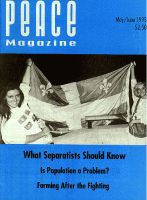
Peace Magazine May-Jun 1995, page 23. Some rights reserved.
Search for other articles by Leonard V Johnson here
The roles for Canadian forces abroad are not entirely unpredictable. Canada is not going to intervene unilaterally anywhere, and any power wanting to do so will seek international legitimacy by securing U.N. approval and the partnership of international allies.
Another Desert Storm-type operation cannot be ruled out for all time. However, it seems more likely that future threats to oil supply from the Middle East will not be caused by territorial aggression but by revolts against the autocratic, oligarchic regimes in the region. There, as elsewhere, wars will probably occur within states, not between them.
My premise is that the Canadian Forces are likely to limit their role to monitoring ceasefires to which contending parties have agreed--i.e. peacekeeping under U.N. auspices.
Canada is a fortunate country. It has no military security imperatives outside its own territory. Indeed, except for its obligations to the U.N. and NATO, Canada has no foreign policy goals that cannot be better met by non-military means.
Prime Minister Chretien has stated that Canada's future military commitments to the U.N. will be affordable and limited to peacekeeping with a clearly defined, limited mandate.
After a period of increasing demand for U.N. peace operations, the prospects for the future now look much more limited. The U.N. is now facing numerous constraints on its ability to intervene. The main limitation is a long-standing one: its lack of legal authority to intervene in matters that are essentially within the jurisdiction of any state. But there are four other persisting constraints as well:
a) The U.N. lacks any powerful intervention forces of its own, a condition that seems unlikely to change.
b) The U.S. is unwilling to place its forces under U.N. command or to act at all at risk of loss of life. This also is unlikely to change.
c) The U.N. is perennially short of money. It has too little money to meet its present commitments--even for peacekeeping--and obviously cannot afford to take on new ones.
d) The U.N. needs to act impartially and evenhandedly. This is fine in peacekeeping but it has prevented either contender from winning the war in Bosnia and it has discouraged both sides from seeking a negotiated end to the conflict. Humanitarian relief is tantamount to siege-breaking and has prolonged the war.
For all these reasons, under present circumstances there is no future for "peacemaking," or "peace enforcement" as it is more accurately called. To appraise the more likely future of military actions by the international community in local wars, it is important to ask this basic question: Why are wars fought?
Wars are fought to determine who will prevail when they end--who will be left standing. Wars end when one side concedes defeat, or when both decide there is more to gain by negotiation than by fighting. Once wars begin, there is blood to atone for and it gets harder to accept defeat.
The U.N. could stop wars by two other possible measures. First, it could intervene on the side of the contender most likely to win (e.g. the Serbs in Bosnia). Alternatively, it could defeat both sides with overwhelming force and impose a settlement. However, neither measure would produce an enduring peace. Neither is feasible anyhow.
There is a third course: feed the hungry and attempt to persuade the contenders to accept mediated settlement. Unfortunately, this option prolongs the war.
Until U.N. intervention can be made effective, it will be limited to permissive peacekeeping operations after a ceasefire agreement has been reached. A more promising approach might be preemptive intervention, as in Macedonia. However, such an interposition of foreign forces will not prevent fighting if the parties decide to go to war.
I conclude that U.N. conventional peacekeeping is the only role open to the Canadian Forces abroad. This is a discretionary commitment and it will always depend on the forces available. It will not, of itself, provide justification for substantial combat forces. Yet that prospect, because it is likely, is the future for which Canada should be planning.
Maj-Gen (Ret.) Leonard V Johnson chairs Canadian Pugwash.

Peace Magazine May-Jun 1995, page 23. Some rights reserved.
Search for other articles by Leonard V Johnson here